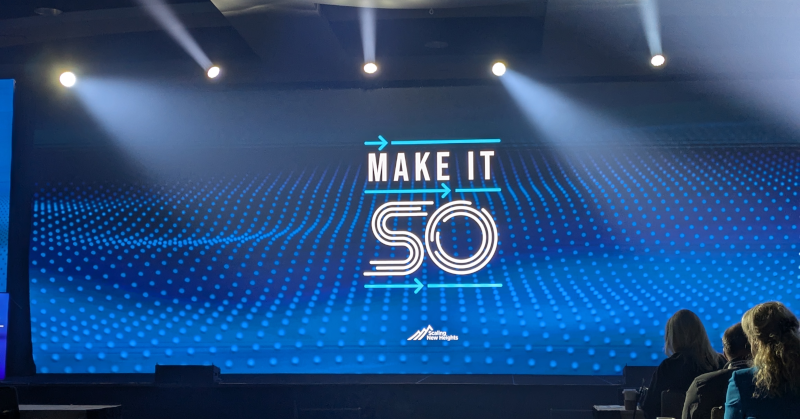During the last day of Scaling New Heights 2024, Joe Woodard rounded out the week with his closing speech by unpacking the theme “Boldly Go” and explaining how it dovetails with next year’s theme. He discussed why boldness and courage are essential for affecting positive change in life, meeting our challenges, and growing as people and professionals.
Woodard invoked some of the multitudes of disruptions facing the client accounting services (CAS) industry, including regulatory changes, mergers and acquisitions, automation solutions such as artificial intelligence (AI), and other factors actively reshaping the profession—and how boldly adapting to these challenges creates unique opportunities for growth.
Beyond “Scaling New Heights 2024: Boldy Go”
Woodard emphasized that “action” is the necessary culmination of a “courageous response” to adversity, referencing John Maxwell’s concept of “feel fear and do it anyway”—or, as Woodard explained, to “proceed afraid.”
“Up to this point, we've talked disruption, we've talked opportunity, we've talked leadership, we've talked direction, and we've talked courage,” he said, “but we've saved this for my final address to you: action.”
The four principles of courageous action
Woodard outlined several key principles, which he argued are essential for courageous action.
Principle 1: Manage the right thing
Woodard mentioned the event’s keynote speaker, Dr. Michio Kaiku, saying, "if I could bring [him] back up here, he would tell you that space and time are the same universal substance…the only one who can manage time would be what [Dr. Kaiku] would call the God equation and what I would call God.”
Woodard argued that time is not an asset; it’s a constraint. Trying to manage time is folly, and seeking to manage time is a way to engineer a “perpetual state of failure.” Since time is an aspect of existence that is out of our control, trying to control it is doomed to failure.
Instead of trying to manage time, Woodard suggested that what we really want when we discuss “time management” is to manage tasks optimally to generate desired outcomes. This shift in mindset, Woodard argued, is a key part of “courageous action.”
Principle 2: Focus on the one task
Woodard continued his talk by emphasizing the importance of focusing on one thing at a time. “Right now, someone in this room of about fifteen hundred people, we probably have about twenty people checking [their] email…check your email if that’s what you want to do, but what I can guarantee you is if at any point you looked down at your device since I have taken this stage, you have not heard something I’ve said.”
He argued that multitasking is a myth—that it doesn’t make us more effective at our jobs. “What you’re actually doing is diminishing the effectiveness of all tasks that you’re oscillating between,” he said. “Which is why you’re exhausted by noon.”
Principle 3: Measure the right thing
The next principle Woodard laid out was about the value of our daily efforts. He said that part of executing courageous action necessitates knowing how to measure success.
“Whenever you're measuring your day, sit back and think, ‘what were the outcomes of my day? What was what were the values of those outcomes?’” He also stressed the importance of measuring success by the intrinsic value of our daily outcomes, not just by revenue earned. “Value is not always financial.”
Principle 4: You can't give 110%
The final principle was about making the most of each day—because once it’s gone, so are its opportunities.
“The belief that exists behind this one is, ‘I can skate today, and I'll make it up tomorrow,’” Woodard said.
He addressed that, technically speaking, it’s impossible to exert more than 100% of your effort. He explained that “giving 110%” is more about adopting a mindset of carpe diem—“seizing the day”—than a literal measurement of one’s output.
The seven roadblocks
In addition to the seven principles of creative action, Woodard outlined seven common roadblocks.
Roadblock 1: Procrastination
“Procrastination loves three things, the first of which is fun,” Woodard said. “Procrastination loves the easy. Procrastination loves the predictable.”
Failure to do what would be the most valuable isn’t simply a failure to act, Woodard said—it’s actually just acting on the wrong things.
He also explained that doing tasks that seem productive instead of taking care of something that is higher priority is a form of procrastination because it gives oneself an excuse to procrastinate. Instead, embracing the unpredictable is the key to not procrastinating, he said.
Roadblock 2: Squirrels!
Much like how a dog may get distracted by the sudden movement of squirrels, sudden distractions take us out of the zone and prevent us from staying on-task.
Roadblock 3: Weariness
There is a difference between being weary and being tired; we can be tired and still motivated to take courageous action. However, when the adrenaline runs out, and weariness hits, it can be difficult to move past it until we rest.
Roadblock 4: Obsession
When we are obsessed with something, we have a delusion that if we act on our obsessions, we will feel sated; instead, we only feed our obsessions, which get in the way of things that matter more.
Roadblock 5: Hyperanalysis
Like Roadblock Four, hyperanalysis can be a paralyzing influence. We cannot act courageously “until we accept the fact that the balance sheet of life never balances.”
Roadblock 6: Rescuing
There is an endless vacuum of human needs, and it is not your job to fill it. You cannot save everyone from themselves, and sometimes, trying to anyway only diminishes your ability to fulfill your own needs.
Roadblock 7: Psychological roadblocks
The seventh roadblock encompasses several psychological barriers to acting courageously.
Worry
Spending mental energy on things that have not happened yet and may not happen. Planning a concrete course of action to address what worries you is the inoculator of worry.
Dread
Spending mental energy on things that have not yet happened but are inevitable. Planning can also be helpful in assuaging dread.
Fretting
Spending mental energy on things over which you have no control. Acceptance and adaptation are the inoculators of this.
Strife
People are imperfect, so facing strife is inevitable. Grace, mercy, and positivity help us move past strife and focus on what matters.
Guilt, regret, remorse
When we fail at something, sometimes we punish ourselves with guilt, regret, and remorse, which get in the way of courageous action. Learning to forgive ourselves and others and let go is hard, but it is the key to overcoming these roadblocks we put in front of ourselves.
Make It So
Throughout his speech, Woodard inspired the audience to reflect on their personal and professional goals and encouraged them to overcome the disruption. As his talk drew to a close, Woodard explained that courageous action wasn’t just the logical conclusion of “boldly going.” In fact, “Make It So” is the theme of next year’s “Scaling New Heights” conference.
Woodard credited author David Allen with inspiring his closing speech, revealing that Allen would present at next year’s show—promising that Scaling New Heights 2025 would provide even more insightful discussions about life, running a business, and more.
Woodard left attendees with plenty to think about as they journeyed home. Hopefully, next year, they will return for more growth-minded insights.
.png?width=150&height=63&name=TWRlogo-regmark_blueblack%20(1).png)
.png)










Do you have questions about this article? Email us and let us know > info@woodard.com
Comments: